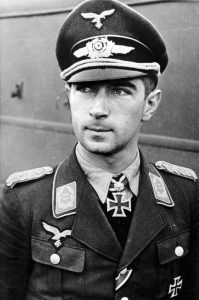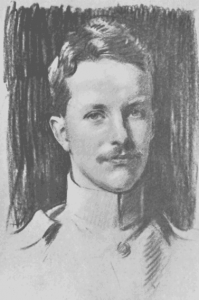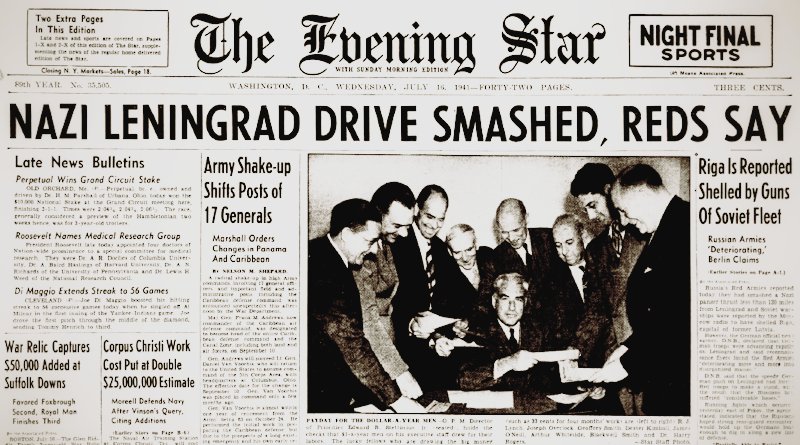World War II Chronicle: July 16, 1941
Click here for TODAY’S NEWSPAPER

Near the bottom of the front page is a story about Werner Mölders, just decorated by the Führer for becoming the first Luftwaffe pilot to score 100 aerial victories during World War II. Lt. Col. Mölders earned Nazi Germany’s first-ever Knight’s Cross with Oak Leaves, Swords, and Diamonds — and is one of just 27 men who will do so.
Mölders notches 115 official victories (counting the Spanish Civil War) before a November 1941 crash-landing takes his life. Incredibly, Germany produces 103 pilots who claim 100 or more downed enemy aircraft by war’s end. 15 pilots would reach 200. Two pilots would surpass the 300 mark…

Also on the front page is a brief mention of Maj. Kermit Roosevelt, who has now begun two world wars as a British Army officer before transferring to the United States Army. Former Pres. Theodore Roosevelt’s second-oldest son will be spending the night at the White House visiting his cousin. During the first world war Kermit joined the British Army as an honorary captain, fighting with the Machine Gun Corps in Iraq, where he earned a Military Cross. Once the United States joined the fighting, he resigned his commission to command an American artillery battery, serving in the Meuse-Argonne campaign.
When war broke out in Europe, Kermit re-joined the British Army, serving in Norway and North Africa before receiving a medical discharge. He appealed the discharge with his friend Winston Churchill, but the prime minister upheld the decision. Pres. Franklin Roosevelt managed to secure Kermit a commission as an Army major, and he spent the rest of his days in Alaska where he worked as an intelligence officer until he committed suicide on June 4, 1943.
We mentioned Franklin Roosevelt’s sons in uniform, but Theodore Roosevelt’s four sons also served in the military. Maj. Gen. Leonard Wood, the former president’s commanding officer during the Spanish-American War, ran a military summer camp (essentially a predecessor to Reserve Officers’ Training Corps) that all four Roosevelt sons joined. Kermit left early to fight for the British. Quentin, the youngest, became a pursuit pilot and was shot down over enemy lines during World War I, becoming the only son of a U.S. president killed in combat. The Germans buried him with full military honors out of respect to his father.
Theodore Roosevelt Jr. and his younger brother Lt. Archibald Roosevelt commanded the first American patrols into “No Man’s Land” during World War I. Archibald is wounded severely enough to merit a retirement with full disability, and manages to rejoin the Army during World War II. When an enemy grenade destroys the same knee wounded in the previous world war, Lt. Col. Roosevelt becomes the first person declared 100-percent disabled in two wars.
Theodore Jr. also rejoined the Army during World War II and earned the Medal of Honor while leading his troops at Utah Beach during the Invasion of Normandy. He died one month later of a heart attack. He is buried beside Theodore Jr. at the Normandy American Cemetery and Memorial near Colleville-sur-Mer, France. We will discuss the Roosevelt sons — Teddy’s and FDR’s — more in forthcoming posts…
Sports section begins on page 16, and the Tigers think they’ve found their replacement for Charlie Gehringer, their aging superstar second baseman. Dutch Meyer is the nephew of Texas Christian University’s head football coach, also named Dutch Meyer. Little Dutch was Slingin’ Sammy Baugh’s favorite target. Meyer scored all of TCU’s points in not just one but two bowl games in a row: he kicked the field goal in their 3-2 victory over LSU in the 1936 Sugar Bowl and caught two touchdown passes, scored an extra point, and kicked a field goal in the first-ever Cotton Bowl.
Little Dutch will serve in the Army Air Force and later becomes a manager. He was the Indians’ Double-A skipper when former Negro League pitcher Dave Hoskins made the Dallas Eagles roster in 1953, making him the first black player in the Texas League. The Shreveport (La.) Sports wouldn’t let Hoskins play against them, but Cleveland had no problem with black players as he won nine games for the Indians after being called up in 1953. While coaching the Tulsa Oilers in 1955, Dutch tried working out throwing drills for a 19-year-old outfield prospect who kept missing his cutoff man. Roger Maris refused, and Dutch kicked him off the team. The Oilers then fired Meyer.
Going back to his football days at TCU, he was teammates with Davey O’Brien, the first Heisman Trophy winner to go pro, signing a contract with the Eagles after being picked fourth overall in the 1939 draft. O’Brien retired after just two seasons and is now an agent in the FBI. Another of Dutch’s teammates is Horace S. “Stump” Carswell Jr. 2nd Lt. Carswell is currently a flight instructor in Texas, but is assigned to a bomber squadron during the war. He will posthumously earn the Medal of Honor and Distinguished Service Cross in October 1944. Carswell Air Force Base is named in his honor…
DiMaggio’s Streak
Versus Indians at Cleveland. Two singles and a walk off of Al Milnar (8-11). Grounded out and doubled off Joe Krakauskas. Streak now stands at 56 games.
| AB | R | H | RBI | BB | SO | Avg. | |
| DiMaggio CF | 4 | 3 | 3 | 0 | 1 | 0 | .375 |
Evening star. (Washington, D.C.), 16 July 1941. Chronicling America: Historic American Newspapers. Lib. of Congress.
https://chroniclingamerica.loc.gov/lccn/sn83045462/1941-07-16/ed-1/
